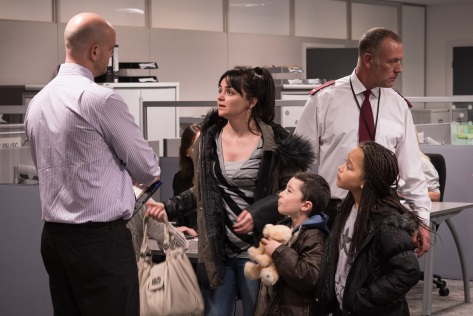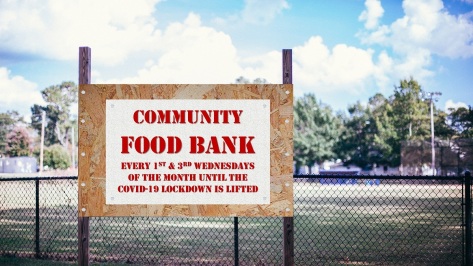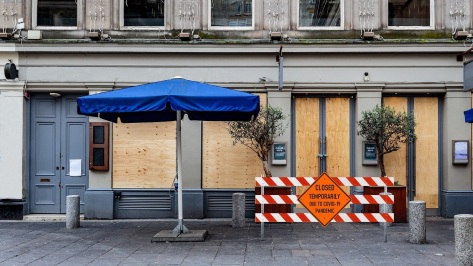Poverty and politics proves an ill mix for pandemic resistance
With UK food banks reporting soaring demand for emergency aid since lockdown began, the Government’s past and present political choices have allowed coronavirus to make an existing pandemic of poverty even worse
By Mark Cantrell

VIRUSES don’t do politics – they leave that to their human hosts – but if Covid-19 was inclined to a party rosette it would doubtless be a shade of austerity blue.
Okay, that’s facetious. But coronavirus has certainly amplified a pre-existing pandemic of poverty; one that has been nurtured by a decade of Conservative-led welfare ‘reforms’ and cuts to public spending.
This age of austerity represented an effort to shrink the State and transform British society into something leaner – and most definitely meaner – under the guise of rebalancing the nation’s finances in the wake of the 2008 financial crash.
“We’re all in it together,” as one of austerity’s chief architects, former Chancellor of the Exchequer, George Osborne often said. The line was echoed in the early stages of the pandemic lockdown, but now as then, some of us are more ‘in it’ than others.
Combined, Government austerity has withered the means locally and nationally to weather this Covid-19 storm; it has shredded the social security safety net, disproportionately affecting the poorest and most insecure groups in our society. Then there’s the wilful failure of ministers to tackle a chronic crisis in the affordability and availability of housing, which has become a crushing burden on household finances.
Poverty has certainly thrived these last 10 years, despite the best efforts of charities, civil society organisations, churches and community groups across Britain to mitigate the hardships people endure.
Food banks have become a dismal symbol – and measure – of these times, much as soup kitchens were in the Great Depression era. A decade ago, they were a curious rarity; now, they are depressingly familiar.

Over the last few years, the Trussell Trust – a charity that runs a network of some 1,200 food banks – has recorded the grim rise of this emergency response to a national hunger crisis. Now the trust has reported that its network of food banks have experienced their busiest month ever, as demand has soared.
April 2020 – the first full month of lockdown – saw an 89% increase in emergency food parcels given to people across the UK, the trust says, compared to the same period in 2019. This figure includes a 107% increase in parcels going to children compared to last year. This is on top of the rising demand they had experienced pre-pandemic.
“We have been seeing rises in food bank need for the past five years but this 89% increase – with the number of families coming to food banks doubling – is completely unprecedented and not right,” said Emma Revie, the trust’s chief executive.
“People need to be able to put food in their table. The Government must put urgent support in place to ensure people already struggling to keep their heads above water can stay afloat. We have outlined what we need our Government to do – it’s in our power to protect one another. We’ve seen it during this health crisis, and we need it to continue during this economic one.”
This grim reality is rooted in austerity; a political choice. The Government’s welfare ‘reform’ programme is a case in point. Thinktanks, charities, academic researchers, and others have all sought to catalogue the impact of such choices; be they changes to disability benefits, cuts and freezes to housing benefit, restrictions on eligibility, and the implementation of the flagship Universal Credit, among others. All told, these have driven up poverty levels, leaving growing numbers of households unable to make ends meet.
It’s sobering to think first world problems, in one of the richest nations in the world, now includes growing numbers of its citizens who are unable to afford to adequately feed their families.
Lockdown may be easing, but it has piled on the woes, despite the measures Chancellor Rishi Sunak has put in place to alleviate some of the economic impact. There are fears that the billions of extra government borrowing amply paves the way for future ‘belt tightening’ (another of Osborne’s favourite phrases); that is, a new wave of austerity that will hit the poorest hardest.
The economy contracted by 20.4% in April 2020, according to the Office for National Statistics. The same month, it suggests, saw the loss of 450,000 jobs; such figures only add further gravity to concerns over the economic impact of coronavirus and the efficacy of the Government’s response.
For many businesses in the culture, hospitality and retail sectors, among others, the outlook is bleak. A surge of closures is feared once lockdown ends, leading to thousands of further job losses. The situation doesn’t exactly bode well for future food bank demand, as we ponder the prospect of a coming deep recession.
These poor souls will find themselves forced to turn to a pared down and threadbare social security system; one that – as many bodies have testified in their research reports – has become decidedly cruel and unforgiving to those who require its succour.

Waiting game
BACK in early May, the Department of Work & Pensions (DWP) noted that more than 135,000 people were receiving their first payment of Universal Credit after waiting the mandatory – and much criticised – five weeks before receiving support.
These people had applied for the notorious benefit on the last two days of March; a shock to the system for many, who had hitherto thought themselves immune to any need for welfare.
“No child should face destitution as a result of this pandemic. The Government must step in and protect vulnerable children and families.” – Mark Russell
This represented “unprecedented demand” according to welfare secretary Theresa Coffey; more than a month’s worth of applications in 48 hours. All told, by the time these claimants were receiving their first payment, the DWP had received over 1.8 million applications for Universal Credit since the pandemic began.
What’s more, the department had also issued over 700,000 “advance payments” – loans repaid out of recipients’ benefits over the following 12 months – for those struggling to get by during the weeks of their required wait. This approach has long been criticised, with the fear that it simply bakes in deeper hardship.
This month, Citizen’s Advice offered a glimpse of this grim outlook with the findings of a survey of some 500 people who applied for Universal Credit because of the coronavirus. It found that more than half – 53% – have faced hardship waiting for their first payment.
“Universal Credit has been a hugely important safety net during this crisis, but it’s simply not right that some end up skipping meals, borrowing from family members or falling behind on bills while they wait for money to come through,” said Dame Gillian Guy, the organisation’s chief executive.
“The Government has said that it is too complicated to change the payment process for Universal Credit. Yet tackling this technical challenge is needed to reduce the human cost of the five-week wait.
“With the close of the Job Retention Scheme, it’s more urgent than ever that the Government build on its measures by temporarily turning advance payments into a grant.”

According to the organisation’s research, 14% of those surveyed haven’t been able to afford essentials like food and heating; 19% have borrowed money from family and friends to help them get by. Meanwhile, frontline advisers have heard how people are skipping meals, relying on hot water bottles for warmth, and selling personal possessions to make it through the forced delay.
“The five-week wait is a real shock for people navigating the benefits system for the first time,” said Sam Williams, a welfare benefits specialist at the charity’s Warrington office. “You can sense them trying to do the mental maths on whether they can get by until their first payment and even then, if it will be enough for their essential bills and for them to put food on the table for their kids.
“We talk people through their options, but taking an advance is something many feel nervous about. Instead I’ve seen people literally scraping by until their first payment: asking family, and considering credit cards or other forms of credit from lenders; missing bills; and relying on food banks for support. It can put an enormous strain on people both financially and emotionally.”
Hungry for change
IT’S sobering to think first world problems, in one of the richest nations in the world, now includes growing numbers of its citizens who are unable to afford to adequately feed their families.
Along with the Trussell Trust, soaring demand has also been reported by the Independent Food Aid Network (IFAN), which has reported a 175% rise in demand for emergency food aid in April this year, compared to the same month in 2019.
IFAN’s coordinator, Sabine Goodwin called it a “devastating trend” and urged the Government to act “decisively and swiftly” to reverse it.
“Our food bank figures paint a grim picture of what is unfolding across the UK and the numbers of people having to resort to emergency food parcels to survive,” she added. “But the solution to the escalating food insecurity crisis has never been the provision of charitable food aid. Everyone needs to be able to afford to buy food and the bare essentials.”
The Trussell Trust, together with IFAN and a coalition of charities – taking in Child Poverty Action Group (CPAG), Children’s Society, the Joseph Rowntree Foundation (JRF), StepChange, and Turn2us – are calling on the Government to act quickly and forge a stronger lifeline to prevent people becoming destitute.
“No parent wants to depend on charity to feed their own child, but it is clear that food banks are becoming the only option for a growing number of families whose finances have all but collapsed because of Covid-19. Struggle is turning to real hardship,” said CPAG’s chief executive, Alison Garnham.

“The Government has quickly put in place unprecedented and very welcome schemes to support family finances in the wake of Covid-19, but too many households are falling through the gaps. An uplift in children’s benefits should be the priority now to shield children from poverty and its lifelong effects.”
The sentiment was echoed by Mark Russell, chief executive of the Children’s Society, who called for “significant extra investment” in local welfare assistance to allow councils to provide more emergency support.
“It’s a tragedy that double the number of families are having to rely on food banks to feed their children, and a situation which could be prevented with more action to stop children from going hungry,” he said. “No child should face destitution as a result of this pandemic. The Government must step in and protect vulnerable children and families.”
For a political response, we turn to Labour’s shadow secretary of state for work and pensions, Jonathan Reynolds. He called the Trussell Trust’s figures on food bank usage a “worrying sign”.
“The Government risks exacerbating already unacceptable levels of child poverty in the UK,” he added. “While existing changes to Universal Credit are welcome, the Government must take further, urgent action to make sure that no-one goes hungry during the crisis.”
Some praise has already come the Government’s way thanks to the measures it has implemented, notably the Coronavirus Jobs Retention Scheme (furlough), the Self-Employment Income Support Scheme, and some of the changes it has made to help low income people stay afloat. These include some modifications to Universal Credit, and the introduction of a voucher system to ensure free school meals continue for children from poorer families.
However, the two schemes are due to be wound down in the coming months. Meanwhile, for all the improvements made to Universal Credit, such as increasing the amount paid, the five-week wait remains – as does the Government’s overall benefit cap, leaving many no better off. As for the voucher scheme, it has been beset with problems, all too often leaving families with nothing.
Given the situation, the coalition around the Trussell Trust and IFAN are calling for urgent action to establish better support for families at the sharp-end of all this. They want to see all local authorities in England adequately funded to provide emergency cash grants to people in difficulty, thereby bringing the country more into line with Scotland, Wales and Northern Ireland.
This is the first step towards creating a temporary Coronavirus Emergency Income Support Scheme, the coalition says would ensure everyone has enough money in their pockets to afford essentials during the crisis.
“But the solution to the escalating food insecurity crisis has never been the provision of charitable food aid. Everyone needs to be able to afford to buy food and the bare essentials.” – Sabine Goodwin
Further measures in the scheme would include increasing benefits that go to families to help with the costs of raising children; extending the suspension of benefit deductions to include those advance payment loans for people waiting for their first Universal Credit payment; and lifting the benefit cap to ensure that everyone benefits.
“Food banks do a fantastic job getting immediate practical support to people in their communities, however it shouldn’t be left to charities to do the job our social security safety net should be doing,” said Anna Stevenson, a welfare benefit expert at the Turn2us charity.
“The coronavirus has affected many of us financially; this must be the catalyst for the Government to build upon the steps it has already taken to make sure everyone can afford to put food on the table and not just survive – but be able to thrive.”
Something certainly needs to be done; not just stop-gap measures to help those cut adrift in this time of pandemic lockdown. As the world moves on, and we emerge blinking and uncertain into the atrophied post-Covid economy, we’ll need a social security system fit for the task of alleviating poverty – and so help repair our society – rather than one that simply penalises the poor.
Ministers may say otherwise – indeed they’d be fools if they didn’t – but for years, the Government’s de facto position has been to worsen the levels of poverty in the UK; too many of its policies have served up hardship too readily for it to be otherwise.
Poverty is an ally of pestilence; while we can suffer the hardships of one without the other, they really come into their own through the enabling force of politics. It’s up to use to do something about that.
MC
This article was first posted on Medium, 15 June 2020.
Update (16-6-20): New figures released since this article was first published show that the number of people claiming work-related benefits in the UK went up by 23% in May, coming to 2.8 million. This includes those out of work and those needed assistance to make up low pay.
According to the DWP, the number of claimants increased from 1.24 million, an increase of 126%. The number of people on company payrolls fell by 2.1% (612,000) in May compared to March.
Job vancanies, meanwhile, have fallen to their lowest level on record, though the unemployment rate remains steady at 3.9% in April.
Thanks for taking the time to read this post. For the price of a cup of coffee you’d not only be showing your appreciation of the writer’s efforts, but also helping to support an indie author in these difficult times. Drop by Ko-Fi to make a donation, or if you prefer you can use PayPal.Me. Thanks in advance for your support. It is gratefully received.

